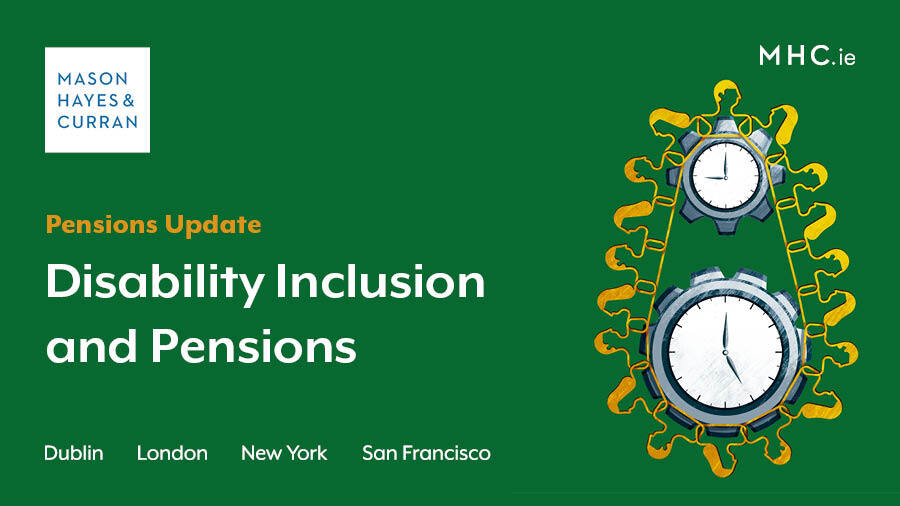
The Pensions Regulator in the UK previously issued guidance on diversity equity and inclusion within pensions. Peggy Hughes and Stephen Gillick, Pensions partners, discuss this new direction in pensions governance and some considerations for the pensions industry in Ireland with an emphasis on disability inclusion.
Diversity, Equity & Inclusion, or DEI, is a familiar concept in the corporate world. However, DEI initiatives with an emphasis on disability, in particular, are not so familiar where pensions are concerned.
Background
There is a common understanding that good governance can help improve outcomes for pension savers. However, there has been less emphasis on the role and benefits of more diverse perspectives on trustee boards and more accessible communications in achieving such improved outcomes. It is interesting, therefore, to see that the UK pensions regulator, TPR recognised this and issued related guidance in 2023. We discuss this and why increasing our attention on disability-related issues in the context of pensions can bring enhanced outcomes for pension savers.
Why does disability inclusion within DEI matter?
Statistics from the UN and WHO tell us that people living with a disability account for approximately 16% of the global population or 1 in 6 of us, ie the largest minority group on the planet. The 2022 Census tells us it is 22% of the Irish population. This group, along with their friends and family, has an annual spending power of approximately $13 trillion. This is potentially a very powerful group with unique perspectives, abilities, and needs.
TPR guidance
It was interesting, therefore, that, in May 2023, TPR issued guidance to help improve pension schemes’ equality, diversity, and inclusion (the UK Guidance). Employers, pension scheme trustees and many within the pensions industry across Ireland are currently working hard to meet new IORP II compliance standards and prepare for auto-enrolment. They are understandably very focused on those issues right now. The prospect of potentially similar DEI guidance/requirements in Ireland might seem like more work and cost. However, improved disability access and inclusion within pensions is arguably another valuable cog in the wheel of better governance to improve outcomes for all. Also, it falls within the pillars of ESG.
A summary of the headline points contained in the UK Guidance includes:
- Trustee boards should regularly review and assess their own diversity of life experiences, expertise and skills
- Employers should consider widening the pool of candidates for trustee boards
- Trustee bodies should consider their existing legal duties under UK equality legislation, to make reasonable adjustments for candidates and existing trustees with disabilities for example, to premises, equipment and technology or the role itself, and
- Reasonable adjustments may also need to be considered as part of the trustee selection process, for example, access to interviews remotely or providing braille or large-print documents in advance
TPR has also added a section on inclusive communications to its guidance to ensure that:
- Scheme communications consider the diverse range of backgrounds, needs and vulnerabilities of their savers
- Trustees are reminded they have legal duties to ensure their communications are accessible for disabled people
Please note that Irish equality laws may have variations to the UK. Always seek independent legal guidance.
Similar guidance for Ireland?
Given all of the change that is taking place in Irish pensions at the moment, similar guidance is unlikely to be issued here for some time. However, it is another area for the industry to consider more actively for the benefit of all concerned. We expect that some in the Irish pensions industry already consider and act on these issues which is to be commended as this concerns all of us, particularly in terms of disability inclusion. In fact, it is something that can easily be factored into client advice as and where appropriate for awareness purposes and consideration.
Comment
Forward-thinking employers, trustees, administrators, and master trust providers may already incorporate some of the UK Guidance recommendations of their own volition. In due course, these or something similar may be more formally adopted in Ireland. We are of the view that pensions should be inclusive and accessible for improved outcomes to be realised. It will be interesting to see how this develops over time. For now, it is, at least, food for thought but hopefully also prompts us to consider how to harness it within our current pensions landscape and activities.
For more information and expert advice, contact a member of our Pensions team.
People also ask
What is The Pensions Regulator (TPR)? |
The Pensions Regulator (TPR) is the UK regulator of workplace pension schemes. It is the public body that protects workplace pensions in the UK working with employers and those running pensions so that people can save safely for their retirement. |
How does disability inclusion fall within the pillars of ESG? |
Disability inclusion is a key factor within the ESG framework: Environmental: The requirement to ensure the sustainability of built environments and future-proof business practices means that companies must adhere to accessibility regulations and cater to ageing populations. Social: The criteria relating to how companies treat their labour forces and local communities extends to equal employment for people with disabilities, health and safety compliance and the provision of products and services to the disabled community. Governance: The evaluation of board composition and management practices necessitates representation of disabled people at leadership level, as well as corporate strategies for disability inclusion. Source – The Valuable 500 Spotlight 4 May 2023 |
Has the UK Guidance had any impact? |
Since the introduction of the UK Guidance, it is interesting to note that research commissioned by advisory firm Cardano in 2023 surveyed 120 UK pension funds and professional trustees, and found that 46% have now implemented DEI strategies, marking a substantial rise from 26% in 2022. However, respondents acknowledged the need for greater efforts to attract a more diverse range of talent, especially from underrepresented groups which included those living with disability. As with auto-enrolment, it will be interesting for Ireland’s pensions industry to see how the UK Guidance influences, either independently or through future guidance here, on trustee board composition and the accessibility of relevant communications among other things. |
The content of this article is provided for information purposes only and does not constitute legal or other advice.
Share this:






